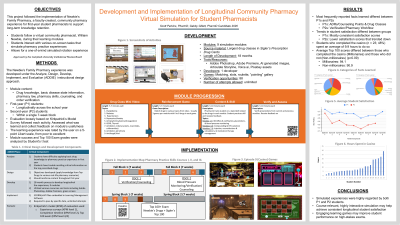Pharmacy Practice
(38) Development and Implementation of Longitudinal Community Pharmacy Virtual Simulation for Student Pharmacists


Scott Perkins, Pharm.D.
Clinical Associate Professor
Campbell University
Buies Creek, North Carolina, United States.jpg)
Gabby Gillett (she/her/hers)
Student Pharmacist
Campbell University
Fuquay Varina, North Carolina, United States
Primary Author(s)
Co-Author(s)
Objective : To describe the process of implementing Newbie’s Family Pharmacy (Newbie’s), a virtual simulated introductory pharmacy practice experience developed for first-year student pharmacists to support long-term knowledge retention.
Methods: The Newbie’s experience was developed utilizing the Analysis, Design, Develop, Implement, and Evaluation (ADDIE) instructional design approach. This approach utilized several critical instructional design tasks including a needs assessment, task analysis, and gap analysis. The result was the creation of a 9-module series that was implemented throughout the Pharmacy Practice Skills courses during the P-1 year. Each module incorporated key components of an introductory community pharmacy rotation: drug knowledge, basic disease state knowledge, pharmacy law, pharmacy skills, counseling, and order verification through various interactive experiences. The drugs tested on the spring Top 100 exam were intentionally utilized throughout the experience. Following feedback from students, unlimited attempts were allowed for each module. Students were asked to complete a short survey at the end of each module to assess what they learned and to provide feedback regarding the module’s usefulness.
Results: 832 surveys were collected, with 459 of these following first attempts by the P-1 students. The average rating for the learning experience was 4.62/5. Student ratings on modules in blocks 1 through 3 averaged 4.67, 4.59, and 4.61, respectively. The most commonly identified learning theme was “drug knowledge”, appearing in 26% of surveys.
Conclusions: Data from first-year students suggest that the implementing simulated experiences across the curriculum can achieve and maintain high favorability when done in a deliberate manner.
Methods: The Newbie’s experience was developed utilizing the Analysis, Design, Develop, Implement, and Evaluation (ADDIE) instructional design approach. This approach utilized several critical instructional design tasks including a needs assessment, task analysis, and gap analysis. The result was the creation of a 9-module series that was implemented throughout the Pharmacy Practice Skills courses during the P-1 year. Each module incorporated key components of an introductory community pharmacy rotation: drug knowledge, basic disease state knowledge, pharmacy law, pharmacy skills, counseling, and order verification through various interactive experiences. The drugs tested on the spring Top 100 exam were intentionally utilized throughout the experience. Following feedback from students, unlimited attempts were allowed for each module. Students were asked to complete a short survey at the end of each module to assess what they learned and to provide feedback regarding the module’s usefulness.
Results: 832 surveys were collected, with 459 of these following first attempts by the P-1 students. The average rating for the learning experience was 4.62/5. Student ratings on modules in blocks 1 through 3 averaged 4.67, 4.59, and 4.61, respectively. The most commonly identified learning theme was “drug knowledge”, appearing in 26% of surveys.
Conclusions: Data from first-year students suggest that the implementing simulated experiences across the curriculum can achieve and maintain high favorability when done in a deliberate manner.

.png)